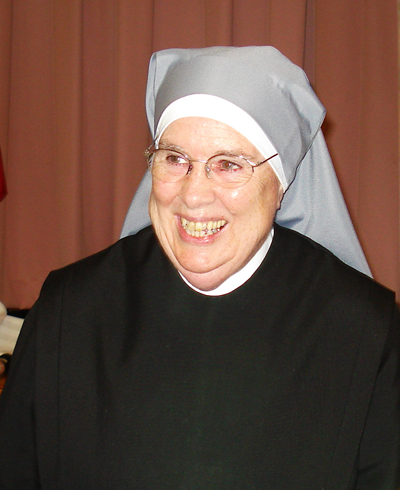

by Gerald M. Costello
When Joan Raber was growing up in San Francisco, she and her fellow students at Presentation High School were expected to perform an hour of community service as part of their commitment to the Legion of Mary—and so she began donating her hour to St. Anne’s Home of the Little Sisters of the Poor. Not only did she find that time passed swiftly; Joan saw how much the Residents appreciated her care and concern. She loved the experience so much that, as she says today, “little by little” the idea of becoming a Sister herself took root—and eventually, with her parents’ proud approval, she became Sister Celine de la Visitation, lsp.
That vocation flourished so much that she is now Mother Celine, the Mother General of the Little Sisters of the Poor, governing nearly 3,000 of them in 32 different countries all over the world from the motherhouse in France. It was in that capacity that she recently spent several days at St. Joseph’s Home in Totowa, meeting with Mother Gerard Marie, lsp, the local superior, and other Little Sisters; and greeting Residents, staff members and volunteers. The visit was part of an extended trip that Mother Celine, the first American to hold her current position, is making to homes in the northeastern U.S.
Vocations were clearly on her mind during a brief interview at St. Joseph’s Home, which also touched on last year’s canonization of St. Jeanne Jugan, who founded the Little Sisters in 1839 in France; the recent visit of Pope Benedict XVI to Great Britain, which included a stop at a home operated by the Little Sisters in London, and gratitude to volunteers the world over who help the Sisters carry out their mission.
“The vocations situation isn’t an easy one,” Mother Celine said. “It’s helpful to remember that it’s always an up-and-down proposition; there are periods when vocations are plentiful and others where they’re not. There are problems with vocations in the United States, no question about it. But it’s much better in other sections of the world. In India, for example, we have many, many vocations.”
One problem in attracting vocations that she cited dealt with the problem of debt. Some young women who might otherwise be considering a religious vocation are often faced with enormous college loan debts, she said, which is a real problem for the young.
“We’re doing what we can to help them,” Mother Celine said. “Young women who are in discernment for our community have the opportunity to work at our homes during the summer, when they can earn money and put it to use offsetting their debts.”
Regarding the state of the Little Sisters in general, the Mother General’s concerns go beyond vocations.“I can’t say there’s nothing to do,” she said with a smile. “Our needs are more pressing now than ever. We’re always aware of our main mission to help the elderly and the poor, and we serve them as best we can in our 203 homes around the world. But there’s always so much more to be done!”
Mother Celine has been to almost all of those 203 homes since she was first elected Mother General in 1996, and those few that she’s missed are definitely on her “to-do” list. French is the common language at the motherhouse and among communities of the Little Sisters in general, and Mother Celine is so used to speaking it that from time to time she caught herself beginning to respond in French to an interviewer’s questions. She sheepishly admitted that once when she was addressing a large English-speaking group she realized midway through her talk that she was delivering it in French.
She was able to speak directly to Pope Benedict during the canonization of St. Jeanne Jugan, an event she looks back on as “a wonderful moment” for the Little Sisters. She was similarly enthused about the Holy Father’s recent visit to St. Peter’s Home in London, where he personally greeted each of the residents at the facility operated by the Sisters.
Accompanying her was Assistant General, Sister Gerard Patricia and the Mother Provincial, Sister Margaret Regina. Mother Celine will go on to visit other individual homes and spend some time with Little Sisters’ postulants in the Washington and Baltimore area.
She drew on her own experience as a young volunteer to formulate a message to all the friends of the Little Sisters. “I was already beginning to see how important our work was,” Mother Celine recalled. “I saw how much the Residents needed us, and that drew me closer to the home.
“You can imagine today how grateful we are for all the help we get. We have advisory boards in all our homes, for example; we need that help. And those who volunteer … they give us help that’s nothing less than invaluable.
“Years and years ago the Little Sisters did everything. There were no employees, no volunteers…then we did it all. Now, of course, it’s different. Now we rely on others to help us. And we’re so thankful that they’re there.”




Mother General visits St. Joseph’s Home